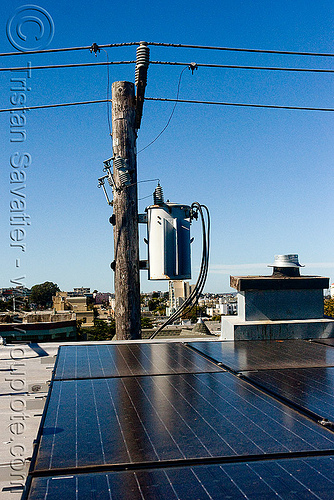
There’s been some discussion about the campaign of EcoMedia, an environmentally focused advertising firm that was purchased by CBS last year. EcoMedia was the firm behind the little green leafs that you may have seen on select CBS advertising earlier in 2011 called EcoAd. The idea behind the EcoAds is that companies purchase the ad space and receive the green leaf on their ads. Then, a portion of the revenue received from the ads goes to community oriented sustainability projects. These projects are usually experiencing a funding gap and the goal of the ad revenue is to fill that gap.
One such project, sponsored by SunPower Corp, is finishing up this week in San Francisco. Tel-Hi, or the Telegraph Hill Community Center has installed a rooftop solar PV system. According to The Good Network, Tel-Hi serves “over 600 people a day, many who are close to or below the poverty line” and “connects children, youth, the elderly and entire families to services and resources necessary to improve health, intellectual development and cultural enrichment. Tel-hi was founded in 1890 to improve the living conditions of immigrants in San Francisco and for the past 120 years, has been a home for people from diverse ethnic and socioeconomic backgrounds.” If there was ever a place to use cost-cutting measures, this is it.
According to the Facebook page and the company press release, the building is now home to 28kW rooftop panels, which aims to offset 86% of the center’s energy usage. EcoMedia partnered with the City of San Francisco and the office of the Environment along with SunPower Corp and non-profit, One Atmosphere to make this project happen.
On the front end, there has been some question about whether the corporations advertising are in fact “green” companies themselves. And, while that debate may continue amongst those behind the scenes, consumers are ultimately the decision makers here. What is clear however, is that regardless of their product lines or services, these companies are setting aside a portion of ad revenue to allow under-funded, community-based sustainability projects to come to fruition.
Having written articles such as, “Is Philanthropy CSR?”, I have often questioned the motives of large corporations, but I think we can all agree that meeting financial shortfalls for projects that benefit the community and environment are a net positive.
Image Credit by loupiote via Flickr under a CC license



